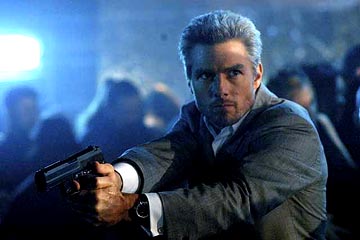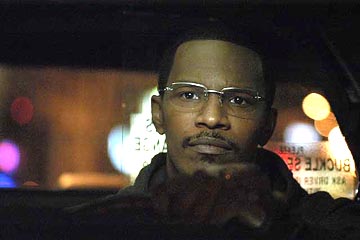

Because Tom Cruise looks the way he does, it's easy to pigeonhole him as an actor. He's over forty, but still has boyishly good looks he used early in his career. He's now beloved by millions of women, but as an actor has not shown much growth. Lately, he has taken to playing darker, more complex characters. Minority Report, Vanilla Sky, and a particularly good performance in Magnolia proved that Cruise (The Last Samurai) was an extremely capable actor, fantastic looks notwithstanding. He one-ups himself here in Collateral, in his first full-blown villain role. He is mesmerizing. Vincent is a gun for hire, in Los Angeles for one night to carry out a series of hits. He is a well-oiled machine. His suit is pressed, and every piece of information he needs is on his laptop computer. He has been doing this for years, and rationalizes away his murders. He didn't kill the man, he shot the man. The bullets and the fall killed him. Vincent is a sleaze ball, but is charismatic enough that he is likable.
His foil is Max, a cabdriver who's also stuck in a rut. Max is excellent played by Jamie Foxx (Breakin' All the Rules, Ali), who is also getting better as an actor each time he strays further from stupid comedy. Foxx gives a performance light years ahead of anything he's done in the past, and is able to hold his own against Cruise, a much better actor. Collateral has a shaky premise, but just watching Cruise and Foxx go up against each other is enough to overlook some of the faults of the script. Collateral is an actor's movie. Director Michael Mann (Ali, The Insider) is an actor's director, who gives his actors the freedom and time to put out thoughtful and engrossing performances. And although Cruise and Foxx dominate the screen time, some of secondary characters like Jada Pinkett-Smith (The Matrix Revolutions, The Matrix Reloaded), Mark Ruffalo (13 Going on 30, Eternal Sunshine of the Spotless Mind), Javier Bardem (Mondays in the Sun, The Dancer Upstairs), and Barry Shabaka Henley (The Terminal, Pavement) all doing very well with their limited screen time.
The one big flaw is how the movie begins. Max picks up Vincent, and Vincent offers him a large sum of money to drive him around all night. Everything in Stuart Beattie's (Pirates of the Caribbean, Shinobi) screenplay portrays Vincent as a consummate professional. Randomly hailing a cab is something far too risky for his character. There are too many things that could go wrong. But without this wrinkle, there would be no story, and the drama between Max and Vincent far outweighs this inconsistency. Max claims he driving cabs part-time, but he's been at it for over a decade. He wants to save money and start a limo service. He's the type of guy that disappears into the background in a big crowd. No one really notices him and he makes no effort to be noticed. Beattie and Mann release only a little bit of information at a time. The big picture, and how all the characters relate to each other is not clear until a ways into the film, and this heightens the drama.
Vincent is the type of guy that wants to prod people until they explode. Max flips out at Vincent's first stop, when a dead man lands on his cab. He keeps driving Vincent because he's afraid for his life. As the night progresses, they talk. Mann devotes a lot of time to their conversations, and Max slowly begins to grow a spine. The conversations are less one-sided, and soon more like verbal sparring. Vincent chides Max for not pursuing his dreams, and just spinning his wheels in a dead-end job. As weird as it is, it feels like Vincent want to help Max do better, which makes his character all the more complex. Max is basically a smart guy, just kind of lazy. A showdown between the two is inevitable, and what makes it all the more interesting is that in any situation it looks like Max will lose.
1 hour, 59 minutes, Rated R for violence and language.